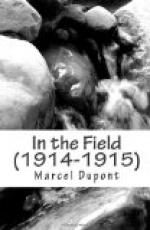“The shepherds’ star,” said G. solemnly.
Strange shepherds indeed must they have been who carried carbines as their crooks, and were provided with cartridges enough to send a hundred and twenty of their fellow-creatures into the next world. The star seemed to hang for a moment some yards from the ground; then slowly, slowly, as though exhausted by its effort, it fell to the ground and went out. The night seemed less clear and less diaphanous.
We had now reached the glass-works and it was there that we were to leave our cooks. No one would have supposed that this large factory lay idle, and that the hundreds of workmen employed there were dispersed. On the contrary, it seemed to have retained all the animation of the prosperous enterprise it had been before the war.
It was a large square of massive buildings, almost a miniature town, planted on the side of the canal, like an outlying bastion of the suburbs of R. The low white walls, crowned with tiles, had the stunted appearance of military works. But a nearer view gave rather the illusion of the life in a busy factory at night-time. The gateway opened on a courtyard, with furnace fires shining here and there. Shadowy forms passed backwards and forwards, enlivening the dim scene with the bustle of a hive. Men came out by fives or sixes, laden with different kinds of burdens, and disappeared into the darkness, making for mysterious goals. In front of the open gate other figures were unloading heavy cases from vans. These quondam glass-works were now a depot for the Army Supply service, and a huge kitchen, which administered and fed the whole sector of trenches, of which ours formed a part.
The Germans knew this. So every day and many times a day their guns fired a few salvoes of shells on the huge quadrilateral. But our good troopers were none the worse. Instead of working in the large buildings, part of which had already been destroyed by shells, they utilised the vast basements of the factory. There were the stores, and there they had their kitchens, where they worked day and night to supply their comrades in the trenches with the hot abundant food which twice a day made them forget for a few minutes the hardships of the cold, the rain, and the mud.
Our column halted under the bleak wall. At the wide gateway a sentinel was on duty, standing motionless, muffled in a heavy grey cloak; and through it our cooks passed, disappearing into the darkness, under the guidance of the liaison orderly of the preceding detachment. Whilst waiting for his return from the journey through the labyrinth our Chasseurs had a short rest before beginning the most difficult part of their journey—the last stage on the way to the trenches we were to occupy.
I took the opportunity of talking with an infantry captain who was there, walking up and down with his face buried in a thick muffler and his hands in the pockets of his heavy overcoat, on the sleeves of which three small pieces of gold lace were just discernible.




